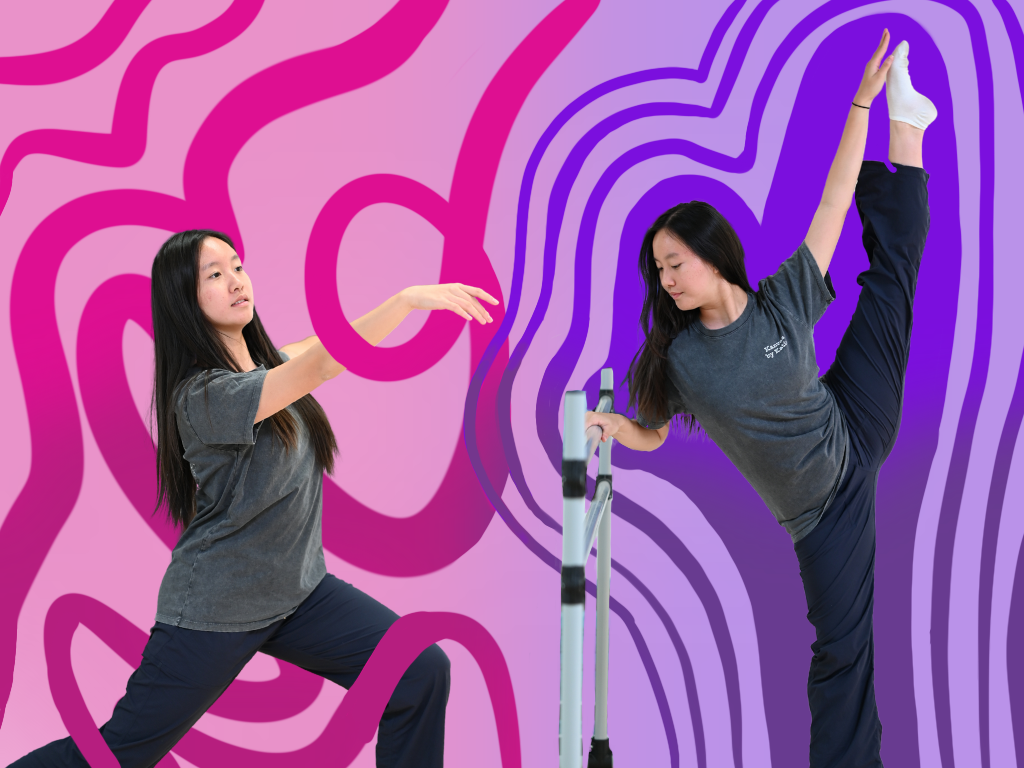Nikoloff discusses identity in second philosophy seminar
Nikoloff displayed these two works of art on the projector and asked students which painting they identify with more. The majority of students agreed that they associated themselves with the image on the left, which depicts a separation of the self and other, while the image on the right conveys a sense of collectivity with everything else.
March 17, 2016
Head of school Christopher Nikoloff hosted the second philosophy seminar of his “Who Are You?” lecture series yesterday during long lunch from 11:45 a.m. to 12:45 p.m in the Main conference room.
Six seminars on philosophy are held through the course of each year, and this the sixth year that Nikoloff is delivering the lecture series.
Out of the four topics covered in the lecture series, two are rooted in Western philosophy, and two are based upon Eastern philosophy. Yesterday’s seminar surrounded Eastern philosophy and encompassed the perception of human identity.
At the beginning of the discussion, Nikoloff recapped the previous meeting, which surrounded the changes a person undergoes over time. The group discussed how everyone is physically and psychically a different organism over time and what this means regarding identity.
The next part of the lecture served to familiarize the students with traditional concepts of human nature: the blank slate, the noble savage, and the ghost in the machine.
The blank slate view of human nature, first proposed by seventeenth-century philosopher John Locke, deals with the concept that we are born with no alignment, neither good nor evil, and it is the environment around us that shapes our values and personality–the “nurture” aspect of the popular dictum “nurture versus nature.”
The noble savage, introduced by Romantic philosopher Jean Jacques-Rousseau, embodies the idealistic concept that humans are born intrinsically pure and that society and civilization corrupts them, and that in the primitive state of man, human beings were noble.
The final and most widely accepted conventional view of human nature, the ghost in the machine, is the idea that there is a separation between the entity within the body- the soul, spirit, or ego- and the body itself.
After discussing these customary notions of human nature, as well as the modern disciplines that contradict them, Nikoloff went on to present the key concept of the lecture: the relation between the self and other, and what this says about one’s identity.
To introduce this, Nikoloff played a recording of a music piece by Mozart, and asked the students what they heard on the simplest, most generalized level. The answer was sound, but also the silence that was heard between the notes, the presence of which was necessary for the music to be heard.
“This is inviting you to think of a different relationship between sound and silence: that instead of being opposites, they are complementary and need each other,” Nikoloff said. “Without silence, we wouldn’t have sound. Imagine continuous sound without silence- if that’s all there ever was, eventually we wouldn’t really know what sound is.”
Nikoloff spoke about other similar relationships that perhaps are not opposites, but are dependent upon each other, each part supporting the other being possible. Examples of these polarities included solid and space, light and darkness, and motion and stillness.
This was tied together with the universal philosophy of the Yin-Yang, which demonstrates how there is an intrinsic link between positive and the negative, which are dependent upon the presence of each other.
The group then discussed the separation between the self and everything else, and conversed about what human aspects belonged in the category of the “self” and which could be viewed as part of the “other.” To end the seminar, Nikoloff introduced the analogy of a magnet to explain this profound polarity.
“Imagine that you and everything else are two ends of the magnet–you need each other to exist,” Nikoloff said. “From an existential standpoint, you and everything else are two terms of the same entity. Just like the magnet, you need everything else to exist and everything else needs you to exist.”
Nikoloff recounted what he hopes attendees will take away from today’s seminar and the lecture series as a whole.
“I hope they can get a sense that philosophy is fun and basic to being human and very relevant and central to their lives, and that it will help them think a little differently about themselves and their surroundings,” he said.
Misha Tseitlin (11) gained another level of awareness about identity from Nikoloff’s seminars.
“In both the last seminar and this one, you talk about your perception of self and what it relies on- mental, spiritual, emotional- and whether there’s a soul or there’s a body,” he said. “I think that’s all something we need to consider but don’t on a regular basis.”
The next philosophy seminar will continue the discussion on identity and its date will be announced at upcoming class meetings. All faculty and students interested in participating can attend.


















![“[Building nerf blasters] became this outlet of creativity for me that hasn't been matched by anything else. The process [of] making a build complete to your desire is such a painstakingly difficult process, but I've had to learn from [the skills needed from] soldering to proper painting. There's so many different options for everything, if you think about it, it exists. The best part is [that] if it doesn't exist, you can build it yourself," Ishaan Parate said.](https://harkeraquila.com/wp-content/uploads/2022/08/DSC_8149-900x604.jpg)




![“When I came into high school, I was ready to be a follower. But DECA was a game changer for me. It helped me overcome my fear of public speaking, and it's played such a major role in who I've become today. To be able to successfully lead a chapter of 150 students, an officer team and be one of the upperclassmen I once really admired is something I'm [really] proud of,” Anvitha Tummala ('21) said.](https://harkeraquila.com/wp-content/uploads/2021/07/Screen-Shot-2021-07-25-at-9.50.05-AM-900x594.png)







![“I think getting up in the morning and having a sense of purpose [is exciting]. I think without a certain amount of drive, life is kind of obsolete and mundane, and I think having that every single day is what makes each day unique and kind of makes life exciting,” Neymika Jain (12) said.](https://harkeraquila.com/wp-content/uploads/2017/06/Screen-Shot-2017-06-03-at-4.54.16-PM.png)








![“My slogan is ‘slow feet, don’t eat, and I’m hungry.’ You need to run fast to get where you are–you aren't going to get those championships if you aren't fast,” Angel Cervantes (12) said. “I want to do well in school on my tests and in track and win championships for my team. I live by that, [and] I can do that anywhere: in the classroom or on the field.”](https://harkeraquila.com/wp-content/uploads/2018/06/DSC5146-900x601.jpg)
![“[Volleyball has] taught me how to fall correctly, and another thing it taught is that you don’t have to be the best at something to be good at it. If you just hit the ball in a smart way, then it still scores points and you’re good at it. You could be a background player and still make a much bigger impact on the team than you would think,” Anya Gert (’20) said.](https://harkeraquila.com/wp-content/uploads/2020/06/AnnaGert_JinTuan_HoHPhotoEdited-600x900.jpeg)

![“I'm not nearly there yet, but [my confidence has] definitely been getting better since I was pretty shy and timid coming into Harker my freshman year. I know that there's a lot of people that are really confident in what they do, and I really admire them. Everyone's so driven and that has really pushed me to kind of try to find my own place in high school and be more confident,” Alyssa Huang (’20) said.](https://harkeraquila.com/wp-content/uploads/2020/06/AlyssaHuang_EmilyChen_HoHPhoto-900x749.jpeg)










